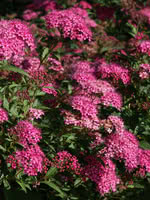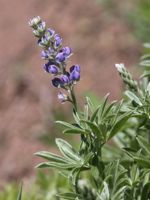Mon-Fri 9am - 5pm Mountain time
Anthony Waterer Spiraea vs Silky Lupine
Spiraea japonica Anthony Waterer
Lupinus sericeus
CUSTOM GROW
CUSTOM GROW
Anthony Waterer Spiraea is a low maintenance shrub with a dwarf, rounded form. In spring and summer rosy pink blooms emerge against green foliage. Its tolerance of a variety of well-drained soils makes it an ideal foundation, landscaping, or border plant.
If deer and rabbit are an issue on your property, consider planting Anthony Waterer Spiraea for its deer/rabbit resistance. Due to its compact form, minimal pruning is required.
Silky Lupine is a native perennial wildflower known for its upright spikes of blue to violet flowers. Blooming from late spring into summer, the nectar-rich, showy blossoms attract a variety of pollinators, especially bees and butterflies. The plant’s fine, silky foliage provides soft texture and visual interest, enhancing landscapes throughout the growing season.
Silky Lupine is a nitrogen-fixing plant that enriches soils and supports surrounding vegetation. Its deep roots stabilize soil, and it spreads naturally by ejecting seeds from drying pods. If spread isn’t desired, new seedlings are easy to remove. While it is foraged by some wild animals, it contains alkaloids that are toxic to livestock. Silky Lupine is well-suited to pollinator gardens, naturalization plantings, erosion control, and ecological restoration projects.
Anthony Waterer Spiraea Quick Facts
Silky Lupine Quick Facts
Toxicity: toxic to sheep and other livestock

